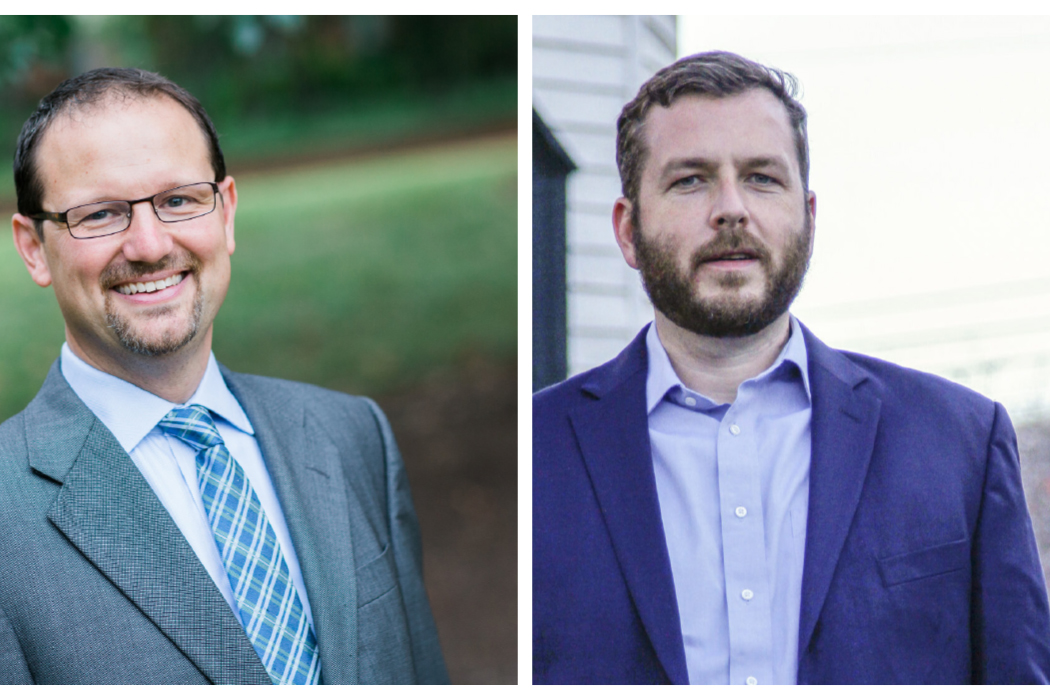Here’s one number to cut right to the heart of Tuesday’s Democratic primary for Charlottesville commonwealth’s attorney: 19. That’s how many times Joe Platania’s office says it has prosecuted felony simple possession of hard drugs as a standalone charge in the last two years.
Platania says that the statistic proves his office isn’t punishing people who break the law too harshly. “In the 19 cases that I had pulled, almost all resulted in treatment and dismissal,” he says. “Very few ended up serving active jail sentences.” He also notes that those cases represent a tiny fraction of the thousands that come across his desk.
Ray Szwabowski, a public defender running to unseat Platania, sees things differently. “I’m not okay with 10 extra, unnecessary, racist felonies every year, and I won’t be if I’m elected prosecutor,” Szwabowski said at a candidate forum hosted by The People’s Coalition last week. He’s challenging Platania from the left, and the key plank in his platform is a promise not to hand out any felonies for drug possession.
The race between Szwabowski and Platania, who himself worked as a public defender early in his career, offers a peek at the path forward for reforming the groaning, serpentine American criminal justice system.
The United States incarcerates more of its own citizens than any other country in the world, by a comfortable margin. Both Szwabowski and Platania agree that one driver of that over-incarceration is overly aggressive prosecutors, who seek harsh punitive sentences for crimes that could be handled more gently—in particular, progressive prosecutors argue that drug infractions should result in treatment rather than jail time. That argument has recently won elections for reform-minded prosecutors in places like Philadelphia and San Francisco.
Platania says he’s proud of his progressive bona fides: The jail population decreased 12 percent in his first year in office, and has continued to decrease as many people have been transferred to house arrest as a COVID precaution. “We don’t use cash bail, we don’t charge mandatory minimum [sentences] without supervisor approval, and we reduce all nonviolent first-time felonies to misdemeanors,” Platania says. He’s also a founding member of Virginia Progressive Prosecutors for Justice, a statewide group made of up 12 of Virginia’s 120 elected prosecutors that has advocated for reforms like marijuana decriminalization.
“Our philosophy is diversion and treatment over incarceration and prosecution, and jail as a last resort not a first option,” the prosecutor says. “But at the same time, we’ve tried to keep an eye on prosecuting violent offenses. It’s a complicated tension that we navigate through.”
Szwabowski, however, says the way Platania’s office operates allows individual prosecutors too much discretion, and that cases have slipped through his fingers as a result.
“I’ve heard Joe brag that culture eats [strategy] for breakfast,” Szwabowski says. “The idea is if you create the right office culture, then people who work for you will make the right decisions in the cases.”
“Having lived through that on the defense side, I don’t think it works,” the public defender says.
Szwabowski wants to bring a more policy-focused approach, and says that his office would have rules in place that would guarantee fewer people are put on probation, probation terms are shorter, and drug possession felony charges would be downgraded to misdemeanors.
At the candidate forum, Szwabowski put his frustration in straightforward terms. “Charlottesville has no systemic approach to criminal justice reform,” he said.
Giving out fewer felonies is a key tenet of progressive prosecution, as a felony charge can derail a person’s life, making it harder to rent housing, take out loans, and find work. And drug felonies in particular are handed out to Black people at heartbreakingly disproportionate rates. Around the country, “African Americans and whites use drugs at similar rates, but the imprisonment rate of African Americans for drug charges is almost six times that of whites,” reports the NAACP.
“Generally speaking, a prosecutor should always be thinking, ‘I am wielding a very powerful sword. I should be careful swinging it,’” Szwabowski says.
The commonwealth’s attorney race might not jump off the page when you eye your ballot. Four years ago, Platania swept past local criminal justice lawyer and advocate Jeffrey Fogel, winning 62 percent of the vote in an election where less than 8,000 votes were cast. In 2011, Dave Chapman won re-election for his sixth term in a primary with just 2,500 votes. The results have real and immediate differences in the city, however.
In a small race, in a small city, in a small legal community, personal relationships loom large. Platania and Szwabowski have been on opposite sides of plenty of cases in the last few years. “There’s a collegiality in the court system that I think is appropriate—we all are professional and try to treat each other with professional respect,” Szwabowski says. “And that’s why I think it was maybe a little surprising to Joe [that I ran]…There’s a way to advocate for change that is polite and professional but forceful.”
Was Platania surprised? “I’m not politically sophisticated enough to predict or know,” he says. “I knew that I thought we had done a good job and I feel like our team should be rehired.”
“For me, these issues are so important that you have to push past the awkwardness,” says Szwabowski. “He says his piece, I say mine, and the voters can decide.”

